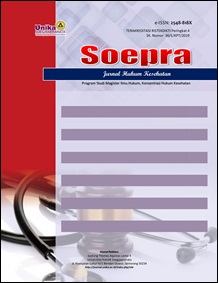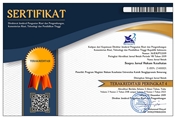Preliminary Review of the Effects of Electronic Medical Administration Records (eMAR) and Electronic Doctor Order Entry (CPOE) on Patient Safety Culture in the Era of Universal Health Services
Abstract
In the era of universal health service [UHC], medicine was always used as part of curative, preventive, and promotive. Following pharmaceutical service standards in hospitals, health centers, and pharmacies, that medicines must be managed properly, including in their use. Medication errors are a leading cause of death in many parts of the world. The factors causing the increase in medication errors related to individuals, such as heavy workload on health care facilities and pharmaceutical service facilities, are often experienced by medical staff (General Practitioners and Specialists) and pharmaceutical personnel (Pharmacists and Pharmaceutical Technical Personnel / TTK), or organizational-related factors, such as inadequate facilities and infrastructure to document medication administration records and the entry of physician orders electronically. The study was conducted cross-sectionally retrospectively, by sharing the results of an initial literature review on the impact of electronic medication administration records (eMAR) and doctor's order entry (CPOE) on patient safety. Using PubMed and Google Scholar, we search for the following terms: "eMAR", "CPOE", "medication error", and "patient safety". Our initial findings reveal that eMAR and CPOE can have an impact on the pharmaceutical workflow, and reduce medication errors, thereby increasing patient safety. Based on the initial review, eMAR and CPOE influence the insight of pharmaceutical personnel, pharmaceutical workflows and impact on patient safety. On the other hand, there is a regulatory direction which is still in the form of a Regulation of the Minister of Health Regulation on Providers of Electronic Pharmaceutical Facilities (PSEF), but it is unfortunate that "eMAR" and "CPOE" have not become clauses governed by the government. Our plan for future research is to conduct a systematic review study to further study the impact of eMAR and CPOE on patient safety.
Keywords
Full Text:
PDFReferences
Undang-undang Nomor 8 Tahun 1999 tentang Perlindungan Konsumen
Undang-undang Nomor 11 Tahun 2008 tentang Informasi dan Transaksi Elektronik
Undang-unadang Nomor 36 Tahun 2009 tentang Kesehatan
Peraturan Pemerintah Nomor 72 Tahun 1998 tentang Pengamanan Sediaan Farmasi dan Alat Kesehatan
Peraturan Pemerintah Nomor 51 Tahun 2009 tentang Pekerjaan Kefarmasian
Peraturan Pemerintah Nomor 82 Tahun 2012 tentang Penyelenggaran Sistem dan Transaksi Elektronik
Peraturan Menteri Kesehatan Nomor 72 Tahun 2016 tentang Standar Pelayanan Kefarmasian di Rumah Sakit
Peraturan Menteri Kesehatan Nomor 73 Tahun 2016 tentang Standar Pelayanan Kefarmasian di Apotek
Peraturan Menteri Kesehatan Nomor 74 Tahun 2016 tentang Standar Pelayanan Kefarmasian di Puskesmas
Peraturan Menteri Kesehatan Nomor 9 Tahun 2017 tentang Apotek
Peraturan Menteri Kesehatan Nomor 26 Tahun 2018 tentang Perizinan Berusaha Terintegrasi Secara Elektronik
Alanazi, Alomar, Aldosari, Shahrani, Aldosari. The Effect of Electronic Medication Administration Records on the Culture of Patient Safety: A Literature Review.
Mahesa Pranadipta, Keuntungan dan Kerugian Pelayanan eHealth di era Digitalisasi, PIT Hisfarma PP IAI, Manado 2018
NAHIT Report to the ONC on Defining Key Health Information Technology Terms. Department of Health and Human Services, 2008
Key Capabilities of an Electronic Health Record System, Institute of Medicine,2003
DOI: https://doi.org/10.24167/shk.v5i2.2462
Refbacks
- There are currently no refbacks.
Copyright (c) 2019 SOEPRA Hukum Kesehatan







